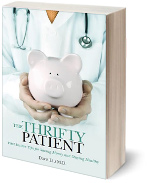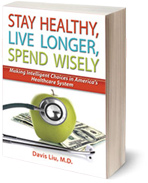Book Review – When Doctors Don’t Listen: How to Avoid Misdiagnoses and Unnecessary Tests
The premise of the book When Doctors Don’t Listen is that increasingly doctors are adhering to algorithms and protocols, known as “cookbook medicine”. In the process, doctors are not listening to patients. Instead, doctors are hearing what they want to hear, ignoring the patient’s story, which results in medical evaluations and treatments which are erroneous. The consequence can be delay in care, unnecessary tests and worry, and at times the path taken is so far astray that patients need to fend for themselves. In one anecdote, a patient flees the emergency room after being evaluated for a headache after a hangover and discovers that her treatment is on the pathway to be evaluated for a possible life-threatening (and highly improbable) subarachnoid hemorrhage which includes an invasive lumbar puncture.
Too far fetched? Do these problems affect a no name hospital? No. What makes the patient stories most interesting is where they occur. The authors, Dr. Leana S. Wen and Dr. Joshua M. Kosowsky, emergency department doctors provide stories and insights from an elite academic medical center, Brigham and Women’s Hospital.
In a book geared to the public, Dr. Wen and Dr. Kosowsky use patient stories, provide background on how doctors are trained, and demonstrate how doctors might drive patients to more testing, misdiagnoses, and not providing the care patients really need by making decisions based on what decision trees or algorithms are available to doctors. Instead of using some common sense and truly listening to a patient’s concerns, which at times can be implied, subconscious, and not initially obvious to doctors, doctors instead choose the more comfortable path of using protocols. The authors hope that by providing patients communication tools and stories of how other patients were led on an course of treatment that becomes increasingly problematic and often feels like is reaching a point of no return (as a doctor reading the stories unfold, it is almost feels like witnessing a car accident in slow motion) that patients can avoid many of the misdiagnoses and unnecessary tests highlighted in the patient case studies.
It is refreshing to see another book focused on how patients can help doctors be better diagnosticians and clinicians through partnership, collaboration, and communications of their stories and concerns to doctors, who are often hurried and are susceptible to cognitive errors and traps (like anchoring bias). We too are human.
There were a couple of points I completely agreed with and for me are the issues front and center and confronting healthcare today.
The world will change with consumer driven health care and not necessarily for the better.
Driving medical costs downward will require re-thinking what really matters in doctor training.
- “The consumer movement in healthcare that was initially intended to empower patients has paradoxically led to less involvement in the most important aspect of their care. Certain aspects of the consumer movement has been positive — for example, the increased education of patients on preventive health and shared decision-making in weighing treatment options. On the other hand, in an era of commodified healthcare, the emphasis on consumerism encourages patients to request “the latest and greatest” technologies: screening tests, subspecialty consultations, whole-body MRIs. Rather than empowering patients to engage in the diagnostic process together with their doctors, this movement only further encourages doctors to forgo the traditional patient-doctor relationship and simply order the latest test, resulting paradoxically, in formulaic, depersonalized care.”
- “Unfortunately, their trust in technology is often greater than their trust in doctors. But we believe that a critical element of doctoring is a commitment to the diagnostic process as a partnership; and part of that partnership involves teaching patients about the appropriate role of testing.”
This is a trend I have highlighting over the years. In my practice, increasingly this is the case that patients are demanding a MRI for back pain via email and skipping the office appointment. What they really want, however, is knowing what is causing their problem, is it serious or life-threatening, and what is the plan on getting them better. They erroneously believe that testing which magically solve their problems, when doctors know it is our training and the ritual of the doctor-patient relationship, (as Dr. Abraham Verghese demonstrates repeatedly) is what patients really want.
Also, as doctors we need to be aware of our cognitive biases and overcome them if we are to provide patients the right care by first listening and being comfortable with uncertainty. If we do so, with less unnecessary testing and being more precise with our diagnoses, it is possible to lower the cost of care. Most of us, however, weren’t trained to the level where it isn’t driven out of us when we graduate from our residency programs.
- “[Dr. Kosowsky] often hear trainees talk about how they want to be given a formula to plug into, a recipe to follow. It’s human nature to want yes-or-no, clear-cut answers. I tell them that it can be uncomfortable to deal with the subtleties and uncertainties that accompany something so complex as human physiology (not to mention psychology!). This may be why listening to the patient’s story can be so hard for doctors, because it introduces these shades of gray and the nuances that we aren’t prepared to deal with, unless we’ve had a lot of practice. This is the kind of practice that medical training should do more to emphasize.”
- “There are signs of profligate use of healthcare resources everywhere we look. CTs are ordered for small head bumps; stress tests are ordered as routine exams; tests of questionable benefit are promulgated as the latest and greatest – only to be retracted when evidence comes out to the contrary and these tests quickly replaced by the next, latest and greatest advance…. What American needs is the right medical care, care that is leaner and more patient-centered starting with the right diagnosis and leading to the right treatment.”
As Dr. Wen, Dr. Kosowsky, and others work to empower patients to play a larger role in their care, I thought the issues about how we train doctors and think about how we as doctors approach patients with our interviewing skills equally as important. This problem of getting yes-no answers to our questions is pervasive in medicine. Part of this bias towards “cookbook medicine” and getting yes-no answers may be the consequence and nature of the emergency medicine specialty that Dr. Wen and Dr. Kosowsky trained in. In my family medicine residency, we focused on the whole patient. As a result, our training including working with office based psychologists and participating in regular balint groups. That experience was far different than the story painted in this book. Though initially I found the addition of psychologists and the required attendance to these touchy feely groups not “real” science and even not a good use of time, the authors point out that to be stellar doctors we need to understand both the physiology but also psychology. We need to know both the science of the body and the science of the mind. It is the latter, however, which is not adequately drilled into doctors as an essential skill equal to the mastery of using a stethoscope, handling a reflex hammer, and interpreting an EKG.
In the end despite patients helping us, it will be doctors who will need to take responsibility of getting the right patient history, have the ability to avoid decide when someone does and does not fit the clinical protocol, and when the medical culture hierarchy is too stifling and too rigid to allow dissention (like a resident physician questioning an attending, a nurse to doctor about the right course of action) to allow the better decision to surface, that will also make the difference. For those interested, books to consider reading include Dr. Jerome Groopman’s excellent book – How Doctors Think (and three other books which I believe should be required reading for medical students, resident physicians, and doctors) as well as Joseph Hallinan’s book Why We Make Mistakes.
Time will tell whether patients can help doctors reach better decisions by helping shape their thought process and being able to stand up for themselves when it seems doctors are heading down the wrong path. Certainly this book is a worthy step to guide us in that direction.
 Get important exclusive advice and tips on how to save money while staying healthy.
Get important exclusive advice and tips on how to save money while staying healthy. Learn how to make intelligent choices in America's Healthcare System.
Learn how to make intelligent choices in America's Healthcare System.
Pingback: How Doctors Listen – and Think « BestDoctors.com: See First Blog
you’re citing the same references I do but you’re drawing slightly different conclusions: fascinating. We even share experience with Balint groups!
I advocate for patient empowerment, and that does *not* include unneccessary or inappropriate testing or treatment. I think the evidence is clear that when providers and patients collaborate, better health outcomes are likely to ensue. Let’s keep the dialogue open!